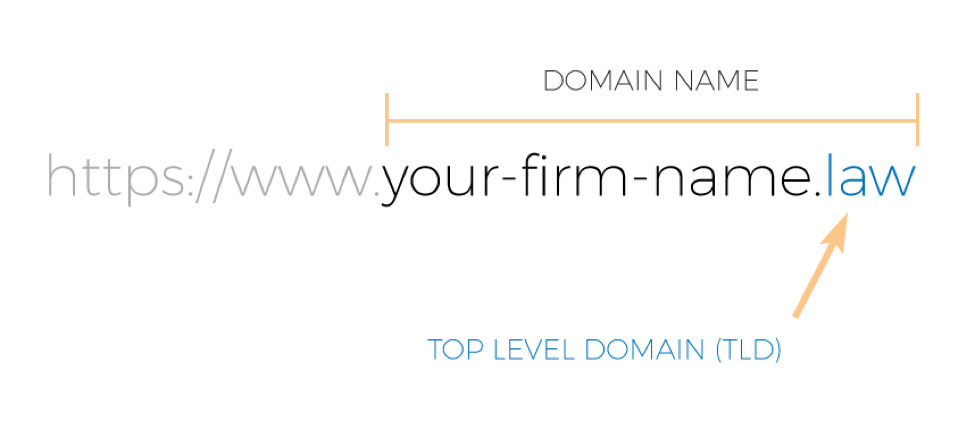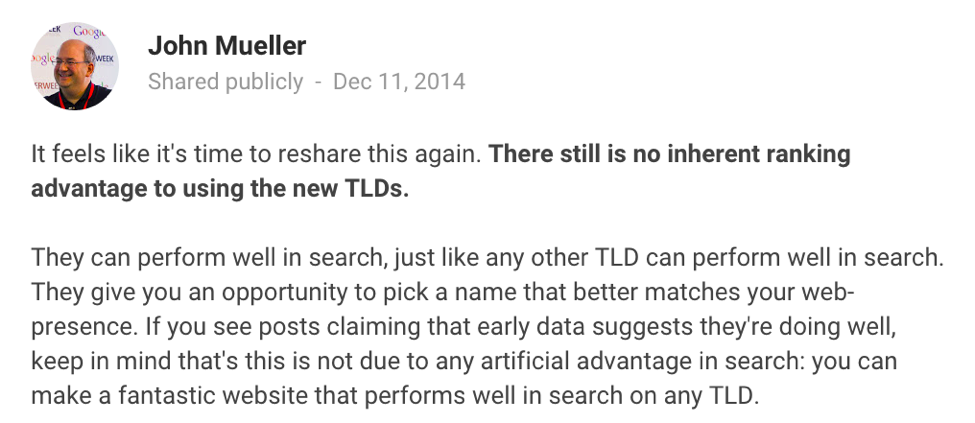If you are considering a website or a blog to showcase your legal services and expertise, there are many different Top Level Domains (TLD) to choose from:
- .com
- .gov
- .org
- .law
This article will examine whether lawyers should buy .law domain and briefly review a few methods to succeed online.
What are Top Level Domains (TLD)?
Without going too in depth about the concept of domain names, here’s a simplified version of what domain names are.
Domain names are the important piece of information that provides a readable internet address of your website. The ending of the domain name is what is known as a Top Level Domain with the most common being .com, .org, and .net.
Overall, there are more than 1000 TLDs available.
Is There Any Significance In Having A .law Domain Name?
Having a TLD can be useful in marketing, search engines, and website optimization. When you consider the most common TLDs like .com, .edu, and .gov, these are recognizable, popular, and rank well courtesy of their authority.
They is some speculation that having these TLDs do not provide measurable proof that you will get ranked higher (such as with .edu and .gov domains).
Also, according to Matt Cutts, new TLDs, like .law, might not receive a boost in the search rankings. Your .law domain will not be treated much differently than other domain names already available.
“Sorry, but that’s just not true, and as an engineer in the search quality team at Google, I feel the need to debunk this misconception. Google has a lot of experience in returning relevant web pages, regardless of the top-level domain (TLD). Google will attempt to rank new TLDs appropriately, but I don’t expect a new TLD to get any kind of initial preference over .com, and I wouldn’t bet on that happening in the long-term either. If you want to register an entirely new TLD for other reasons, that’s your choice, but you shouldn’t register a TLD in the mistaken belief that you’ll get some sort of boost in search engine rankings.”
While Google may not rank a .law domain higher, from a personal point of view, there is significant value to be considered.
What Are The Benefits Of A .law Domain Name?
From a branding point of view, having a .law domain allows you to position yourself as a professional and a figure of authority.
Anyone who registers a new .law domain, must provide a phone number from the licensing of your agency or firm.
Having to go through this additional step during the registration process creates a trust factor for those searching for you.
Buying a .law domain name will provide an additional layer of credibility courtesy of the verification process required.
This is a summary of some the benefits you’ll receive when you buy a .law domain:
- Brandable & Authority. Using this TLD allows you to create a strong and memorable brand. A .law domain can be descriptive and capture the core of your practice. When deciding on your domain name, consider using your own name, area of practice, or your target market.
- Examples:law, NewYorkCity.law, StultzandBrinks.law, jones.law
- Verified & Trusted. When you register your .law domain, you become verified and trusted by those seeking your services online. Only qualified lawyers can apply for this domain. Once approved, you will have a branded and trustworthy domain surrounding your legal profession.
- Competitive & Professional. Your new .law domain will stand out amongst others. The .law is exclusive to lawyers and provides a distinct and official finish to your online presence.
If You Already Have Another Domain Name, Should You Transfer To A .law Domain?
As mentioned before, there may not be any considerable boost to your rankings in the search engines. If you already using a domain and it is working well, you may not want to transfer your website to the .law domain.
Consider .law as an investment in your practice but only if you don’t have a domain name already. When you transfer a website over to a new domain, you may lose traffic and potential clients.
Getting a new .law domain is an ideal choice for those starting a new website.
Aside From A .law Domain, How Can Lawyers Succeed Online?
A domain name is only one of many factors to consider when putting your law practice online.
One of the most critical areas of getting noticed and finding new clients comes from the content you provide.
Here’s a few things you may want to keep in mind:
- Offer meaningful, relevant and original content. Most search engines approve of original content. However, they should be written in a way that’s natural and connects with your target audience.
- Create backlinks on authority sites. When you have published quality content, try to get your site linked with .edu or .gov sites as these have authority. Read law firm SEO Tips here. Note: Never buy backlinks — you could be penalized.
As an authority on the web and a professional of law, you have a responsibility to provide quality content that is relevant and informative to your visitors.
This update from John Mueller on Google’s Webmaster Central makes it clear that content is crucial and the domain name is not given “artificial advantage in search.”
So, Should Lawyers Buy A .law Domain?
Getting a .law domain could be the strategic edge you need to have a competitive advantage online.
However, while a TLD like .law adds a professional touch your online service, providing good content that follows Google’s recommended practices will be much more powerful.
If you are preparing to settle on a .law domain name, remember to incorporate this into your website development:
- Publish high quality, original content on your site
- Provide relevant content to your potential clients and targeted audience
- Avoid SEO practices that could penalize your website (i.e. keyword stuffing, purchasing links, or other Google violations)
Achieving this will lead you to an authority site on the internet especially if you’re considering starting a blog.



